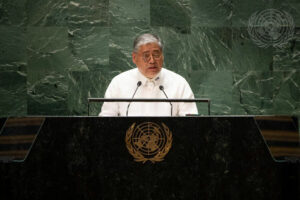MANILA’s top envoy in his speech before the United Nations General Assembly (UNGA) pushed for the peaceful and diplomatic resolution of territorial disputes, particularly in the South China Sea, citing the importance of upholding a rules-based international order.
“Despite irresponsible and dangerous actions against our legitimate activities within our own waters and Exclusive Economic Zone, the Philippines remains committed to diplomacy and other peaceful means to settle disputes,” Philippine Foreign Affairs Secretary Enrique A. Manalo told the Assembly, according to a copy of his speech, dated Sept. 29, which was sent to reporters via WhatsApp on Sunday.
“We will abide by the UN Charter and the Manila Declaration on the Peaceful Resolution of Disputes in asserting our sovereignty, sovereign rights and jurisdiction in the South China Sea.”
The Chinese Embassy in Manila did not immediately reply to a Viber message seeking comment.
The Philippines and China have resumed diplomatic talks on how to ease tensions in the waterway, even as both sides insisted on upholding their sovereign rights over features in the South China Sea.
Manila and Beijing have traded accusations of intentional ramming of each other’s vessels in a series of clashes last month, just after reaching a pact on resupply missions to a beached Filipino naval ship at Second Thomas Shoal.
Mr. Manalo earlier said Manila does not want to gang up against China with the international community in raising the territorial dispute to the UN’s main policy-making body.
The Chinese Foreign Ministry has said Manila and its allies ganging up on Beijing would only worsen tensions and destabilize the region.
“We do not accept narratives depicting the South China Sea as a theater of major power rivalry because they all ignore what is an essential truth: all states in this region have a right to determine their own destiny and secure their own future,” Manila’s Foreign Affairs secretary said in his speech.
Tensions between the Philippines and China have worsened in the past year as Beijing continues to block resupply missions to Second Thomas Shoal, where Manila has a handful of troops stationed at a beached vessel.
China and Russia have also criticized the United States’ move to keep its Typhon missile system in the Philippines as it risks fueling an arms race in the region.
Reuters reported Chinese Foreign Minister Wang Yi said the US deployment of intermediate-range missiles in the Philippines “undermines regional peace and stability.”
Mr. Wang said the deployment “is not in the interests of regional countries.”
The US Army flew the Typhon, which can launch missiles including SM-6 missiles and Tomahawks with a range exceeding 1,600 kilometers (994 miles), to the Philippines in April in what it called a “historic first” and a “significant step in our partnership with the Philippines.”
Philippine Defense Secretary Gilberto Gerardo C. Teodoro, Jr. has said Manila has the right to beef up its deterrent posture amid China’s aggressiveness in the South China Sea. The Philippines is also open to acquiring the Typhon midrange missile system, Agusan del Norte Rep. Jose “Joboy” S. Aquino II said last week, as he sponsored the 2025 budget of the Defense department.
The Philippines, southern neighbor to Taiwan, which Beijing claims as its own territory, is an important part of US strategy in Asia and would be an indispensable staging point for the military to aid Taipei in the event of a Chinese attack.
Mr. Wang said exchanges and cooperation between China and South Korea have become more active this year, Reuters reported.
Manila and Beijing on July 2 reached a “provisional arrangement” for Philippine resupply missions to Second Thomas Shoal, which the Philippines calls Ayungin.
The UN-backed Hague Permanent Court of Arbitration in 2016 voided China’s claim over the waterway for being illegal. Beijing has ignored the ruling.
About $3 trillion worth of trade passes through the South China Sea annually, and it is believed to be rich in oil and natural gas deposits, apart from fish stocks.
Philippine President Ferdinand R. Marcos, Jr. said in his third address before Congress that his government would continue to find ways to de-escalate tensions in contested areas in the waterway “without compromising our position and our principles.”
Mr. Manalo earlier said the Philippines is gearing up for its chairmanship of the Association of Southeast Asian Nations, where it seeks raise its maritime dispute with China.
“The future of the Asia-Pacific is being shaped not by one or two powers, but by all states therein,” the country’s top diplomat told the UN General Assembly. “ASEAN exemplifies the agency of states working together in fashioning multilateral approaches and solutions to present-day challenges.” — John Victor D. Ordoñez with Reuters
